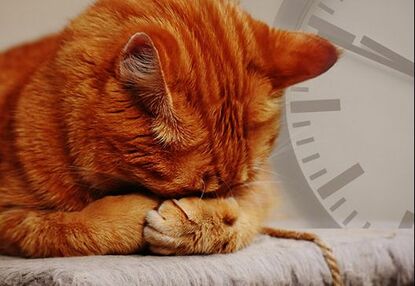
Daylight Saving Time officially begins on March 10th at 2:00 AM.
While thankfully close to the official start of spring, many people as well as their pets can find “springing forward” and losing that hour of purr-ecious sleep both disorienting and disturbing.
Cats, like all animals, are creatures of habit, and unlike people, they don’t have to check a watch or a clock in order to schedule their day. Blessed with their own internal, biological clock, known as the circadian rhythm, they know exactly when to eat and nap, exercise and sleep.
When this rhythm is suddenly disrupted by their owners’ waking up early or returning home from work while they’re still taking their afternoon nap, they can become extremely anxious.
Consider three of the ways the start of Daylight Saving Time may affect your own feline friend.
Feeding Time: If your cat is used to being fed at the same time every day, when her food unexpectedly arrives before she’s hungry, this early meal might throw off her digestive cycle. She may act out rambunctiously, turn up her nose and stalk off or gulp down her food then meow for more out of habit when her usual feeding time comes around.
Medication Time: If your cat is diabetic and receives her medication at a certain time of day, getting it early might be a shock to her system. While an hour usually shouldn’t make much of a difference -- depending on her needs – medicating her early can cause a change in her energy level as her body adjusts to the new insulin schedule. Other medications, such as those for heart failure, can cause problems if they’re administered too early.
Together Time: Although many cats are extremely independent and easily able to amuse themselves on their own, others are far more social and rely heavily on more consistent interaction with their owners. If your cat is one of these, used to you both waking up and leaving home at a certain hour, those vital 60 minutes of “lost” together time can cause her undue anxiety.
The best way of reducing the negative effects of “springing forward” on your cat is to prepare for the time switch a few weeks early and alter your schedule by a few minutes each day. This gradual change is far less noticeable and far less disruptive than changing everything by an hour all at once.
Begin by serving your cat’s meal(s) a few minutes earlier each day. Speak with your vet about the safest way of changing the time(s) she receives any and all of her medications. Leave for work a few minutes earlier each day to acclimate her to your leaving home before the usual time. But most importantly, remain vigilant and be sensitive to any shift in her mood. If she seems anxious or nervous, some extra chin scratches and snuggles may be just what she needs!
Tick tock.









 RSS Feed
RSS Feed